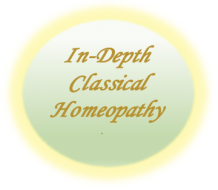The homeopathic approach to the treatment of disease emphasizes using the least amount of treatment and the most gentle remedies so that good health can be attained through stimulating the individuals ability to heal. The whole person is considered, the mental and emotional levels as well as the physical level. The goal is to increase wellness rather than to kill micro-organisms. When the individual is healthy, the disease is naturally thrown off. The basic premise is life preserving rather than life destroying.
Louise Pasteur, the father of microbiology, believed that a germ could be found for every disease. Later in life, however, he realized that what was truly responsible for disease was the inability of the host organism to throw off disease. On his death bed, he was suppose to have said, “ The terrain is everything, the bacteria is nothing.”
If an individual has a strong immune system it is unlikely that they will be affected by the soup of bacteria that constantly swarms around us. It is when we are weakened that we are susceptible to infection. Bacteria are not the main cause of disease they are simply players in a more complex relationship of energies.
The allopathic or conventional approach to disease is combative. The idea is to kill or eliminate whatever is causing the problem. Conventional physicians have declared war on disease. When the first antibiotics were used, they were thought of as “magic bullets.” The simplistic view of genetics at that time led to the presumption that bacterial disease could be wiped our in our lifetime. What was not understood was the true miracle of genetic change that allows bacteria to become resistant and to survive any attempt to kill them.
We are now reaping the result of this over simplistic view of the intelligence inherent in one-celled creatures. Many bacteria are now resistant to all forms of antibiotics and we are entering an age where these drugs will no longer be able to control infections at all. That time is approaching very swiftly. Many hospitals and nursing homes are now inundated with completely resistant varieties of bacteria.
The idea of not having an antibiotic for every infection is a very frightening thought for many people. It could spell disaster and it already has contributed greatly to the health crises. But, as the Chinese proverb says, “ Crisis is a combination of fear and opportunity.” If we continue with the combative approach to the treatment of disease, using more deadly weapons, stronger antibiotics to kill resistant forms of bacteria, we may end up being casualties of our own battle. The nature of these one-celled creatures is to continually adapt, change and resist being wiped out. If we take this crisis as an opportunity for great change, we may discover a way of dealing with the situation that transcends the initial problem.
Bacteria have the ability to do something that we as human beings could learn from. They are able to act together as a community. They share the genetic material that enables them to survive very freely with one another. They are creative, they learn how to adapt to a toxin and then share that ability with other bacteria throughout the planet in a very short time. They are adaptable. Rather than resist change, as do humans, they readily adapt to change. While we plodding humans are busy making war with each other and with bacteria, these one-celled organisms are easily and quickly communicating with one another all over the globe, creating new resistance to our attempts to destroy them. They have much greater global consciousness than us.
If, instead of trying to kill them, we learn from this situation and begin to honor the life processes that are at work, we may end up in a much better place. We may learn that nature provides all life with strong survival mechanisms, killing is not the solution, that everything we do effects everything else on this planet, and that our medicine should respect the powerful laws of nature that are at work. If we learn and accept these principles, we will utilize forms treatment, like homeopathy, that strengthen life rather than killing it. We will begin to understand that the cause of disease is our imbalance with the laws of nature.
When these principles are utilized effectively, improvement on our personal health will have a positive affect on the environment. Getting well from the homeopathic perspective means health on all levels. It means an increase in the ability to communicate, to be creative and share the rewards of that creativity with others, and to be able to feel love and compassion. When many of us are healthy according to these guidelines of health, it would be possible to think of living in peace with other beings on this planet.
You may say, “ it is going to take a long time to make this switch in consciousness.” The fact is we do not have a long time. The sooner we learn to apply principles of healing that are in tune with natural laws, the sooner we can help ourselves. If you don’t know anything about homeopathy, inform yourself. Learn some basic remedies so you can use them for yourself and your family. If you already know something about homeopathy, learn more. If you are already deeply involved tell your friends and health practitioners about it. Those who understand how to use homeopathy will be absolutely essential in helping themselves and others in the transition our pivotal generations is going through.

